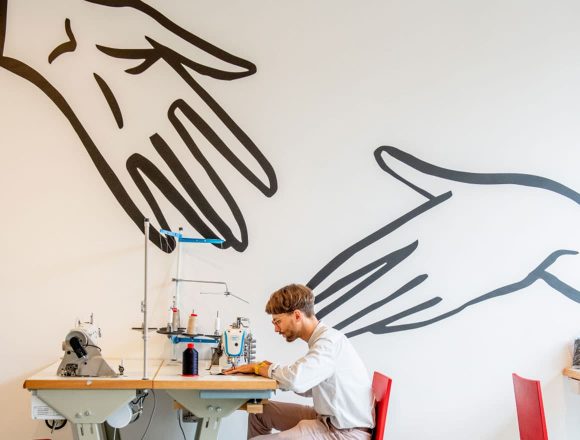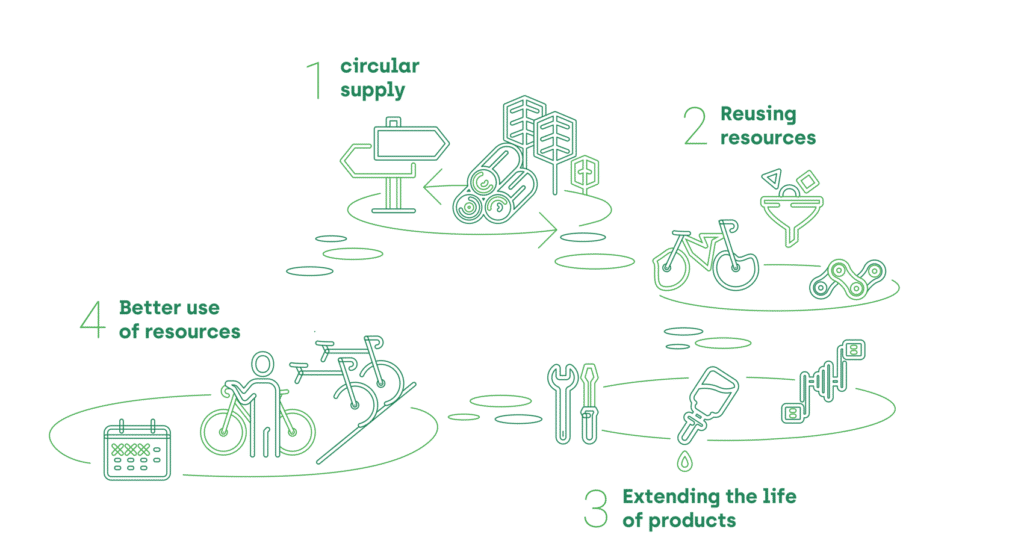Circular economy
Does the concept of the circular economy still seem a bit vague?
Are you looking to connect the dots between the concepts of circular economy and circular business? Circlemade has defined the circular economy through four innovative business models. Find them on this page.

What is the circular economy?

The circular economy is an economic system of exchange and production that, at every stage of the product life cycle (goods and services), aims to increase the efficiency of resource use and decrease the impact on the environment while increasing the well-being of individuals.
Circular companies
Circlemade has defined the circular economy through four innovative economic models. They provide an understanding of the notion of “circular company”.
Circular supply
In the design and manufacture of its products, the company favours the use of :
- renewable raw materials
- recyclable and effectively recycled raw materials
- local resources belonging to either of the above.
This model allows the company to replace the use of resources and materials that have a single life cycle, i.e. non-recyclable and non-renewable.
Two circlemade members explain “circular sourcing”: Sonian Wood Coop and PermaFungi.
Better use of resources
The company is developing an offer that maximizes the use of existing resources by:
- making the product available without transferring ownership,
- sharing.
This model encourages companies to design or make available products with a timeless design, a longer lifespan and greater repairability potential.
Extending the life of products
To achieve this objective of extending product life, the company eco-designs its products. Ecodesign takes into account the impact of the product on the environment throughout its life cycle, from the extraction of the raw materials to its disposal at the end of life.
With eco-design, the company allows customers to use their products for longer.
Eco-design will take into account the improvement of technical characteristics, facilitating predictive maintenance. It will also take into account concepts such as modularity, ease of dismantling or disassembly to encourage parts replacement, repair, upcycling, remanufacturing or recycling.
Resource recovery
The company markets an offer designed from resources considered as waste (destined to be thrown away and with a low economic value).
We can distinguish different types of resource reuse that the company carries out :
- Preparing for re-use means checking, cleaning or repairing recovery operations, by which products or components of products that have become waste are prepared so that they can be re-used without any other pre-processing (DIRECTIVE waste 2008/98 of 19/11/2008) and for an identical use;
- Remanufacturing : An industrial process consisting of restoring a used product (broken down, at the end of its life, obsolete or in a state of waste) to a state, a level of performance and guarantee conditions identical to or superior to its original state;
- Upcycling : the transformation of end-of-life resources into a product with the same or higher quality and economic value than the initial product;
- Downcycling : the transformation of these resources into a product with a lower quality and economic value than the initial product;
- Recycling means any recovery operation by which waste materials are reprocessed into products, materials or substances whether for the original or other purposes. It includes the reprocessing of organic material but does not include energy recovery and the reprocessing into materials that are to be used as fuels or for backfilling operations (DIRECTIVE waste 2008/98 of 19/11/2008).
It is therefore a transformation of materials at the end of their life, by mechanical, chemical, thermal processes, etc., in order to reintroduce them into a production cycle (in part or in full), thus replacing the use of virgin raw materials.
Waste sorting operations are included in this category because sorting enables waste to be channelled into different treatment processes, in particular material recovery.
Two members explain this “resource reuse” model: R-Use Fabrik and Design With Sense.
